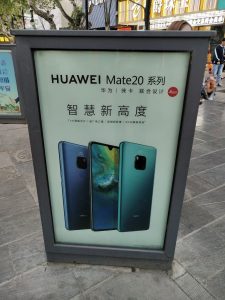 APPS
APPS
 APPS
APPS
 APPS
APPS
China’s leading mobile phone maker, Huawei Technologies Co. Ltd., has set its sights on defeating rival Samsung Electronics Co. Ltd. after confirming its ascent over Apple Inc. in the latest smartphone sales figures.
Huawei became the second most popular smartphone maker globally in the second quarter of 2018, and although Apple retook the spot briefly in the fourth quarter thanks to holiday sales, Huawei returned to the spot in the first quarter by a wide margin.
According to figures published by IDC Research Inc., Huawei shipped 59.1 million smartphones in the first quarter, up 50.3% from the same quarter in 2018, for a 19% market share.
Apple, by comparison, saw sales of its once golden iPhone slide 30.2% year-on-year, to 36.4 million units for a global market share of 11.7%.
Huawei’s ascendancy in the quarter came in without sales of its flagship P30 and P30 Pro, which were announced on March 26 but didn’t start shipping until April.
Those phones have the potential to outsell Samsung’s Galaxy S10 and S10 Pro given widespread critical praise. IDC noted that “Huawei is now within striking distance of Samsung at the top of the global market.”
As seen with many leading electronics companies, smartphones are often only one part of a broader play. While Huawei is deeply involved in the development of 5G data technology, the consumer market remains important and Huawei may be about to play a card that could give it an upper hand over Samsung.
According to a report published by the Nikkei Asian Review, Huawei plans to introduce the world’s first 5G television as early as this year.
The TV is described as offering a high-end 8K display with its development fueled by a desire by Huawei to complete its “ecosystem” of consumer electronics.
Offering 5G in a television would allow a user to use the next-generation data network to access content at high speeds without the need for a wired internet connection or cable television subscription.
Huawei is already a competitor in laptops with its MateBook line, a direct competitor to similar offerings from Apple and Samsung.
The company has differentiated itself from other Chinese firms in the space such as Xiaomi Corp., Vivo Communication Technology Co. Ltd. and Oppo Mobile Telecommunications Corp. Ltd. by offering high-end products with prices to match, whereas the others primarily offer products for medium-tier consumers.
Huawei hasn’t been shy in expressing its ambitions either, with Chief Executive Officer Richard Yu saying in an interview in November that the company wanted to be the No. 1 smartphone player in the world by 2020.
Quarterly year-on-year sales growth of over 50% at the same time Samsung is selling fewer phones makes that goal highly achievable.
Support our mission to keep content open and free by engaging with theCUBE community. Join theCUBE’s Alumni Trust Network, where technology leaders connect, share intelligence and create opportunities.
Founded by tech visionaries John Furrier and Dave Vellante, SiliconANGLE Media has built a dynamic ecosystem of industry-leading digital media brands that reach 15+ million elite tech professionals. Our new proprietary theCUBE AI Video Cloud is breaking ground in audience interaction, leveraging theCUBEai.com neural network to help technology companies make data-driven decisions and stay at the forefront of industry conversations.